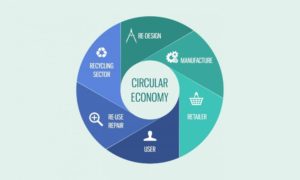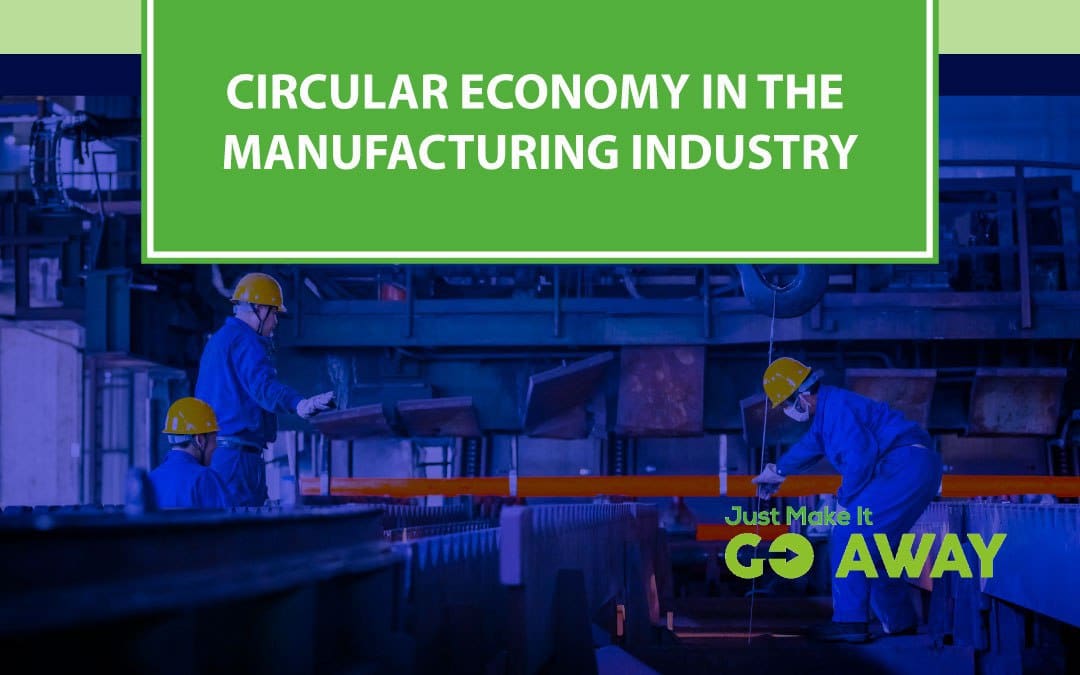Manufacturing industries are a key part of the United States economy. From building cars to making machinery to processing food, these industries contribute 11% to the United States GDP. However, manufacturing is among the most wasteful of industries as well. Industrial practices and production processes are responsible for 33% of total energy consumption and over a billion pounds of annual waste in the U.S. Implementing a circular economy in the manufacturing industry can make all the difference in the long run.
The impacts of manufacturing are so large, that small changes within the industry go a long way. It’s one of the many reasons why green manufacturing practices are so important. The many ways businesses can make their practices more sustainable (including reducing waste, increasing the lifetime use of a product, reusing post-consumer waste, and reducing energy and water usage) can also be categorized as ways to implement a circular economy in the manufacturing industry.
What is a Circular Economy?

The concept of a circular economy is central to sustainability and good business practices. A circular economy in the manufacturing industry refers to utilizing the circularity of production and implementing reuse and recycling whenever possible. Using sustainable supplies and suppliers to reduce waste at product end-of-life and using biodegradable packaging, circular economy practices can be implemented at every stage of production.
Practical applications of circular economics by businesses include creating durable, reusable, good-quality products, recycling materials used in the production of waste products, and how recyclable and reusable the product will be at end of life. Although it may cost more upfront, maximizing both customer satisfaction and the value of purchased resources make this model a win-win. See how linear economy vs circular economy in manufacturing compare and why you should make the switch. Learn how ESG best practices can help you to create a more circular economy.
How Can Manufacturers Implement Circular Economy Concepts?
Circular economy concepts can be used in every part of the production process. Many practices can fall under this title, it’s easiest to break this up into input, process, and output. The three principles of a circular economy.
Quality inputs and auditing of supply chains play a big role in the circular economy equation. These should be done by a third party to ensure their success and recognition. Manufacturers should always audit their suppliers thoroughly, as the raw materials determine the quality of the product itself.
The production process is at the heart of most manufacturing companies and is where manufacturers can have the most positive impact. Just as manufacturers need to audit their suppliers, they also need to focus on quality management throughout the production process. Manufacturers in different industries should always follow the standards specific to their specialty – for example, manufacturers in the automotive industry will have very different testing and QA than quality control for garments and textiles.
Having a set and automated quality management system in place. Manufacturers need to maintain their own equipment and focus on energy-efficient machinery to reduce resource waste, and should also look at their production processes as well; implementing additive over subtractive manufacturing if possible may be more beneficial in the long run.
When it comes to output, there are often two main concepts to implement: recycling and upcycling. In addition to sustainable packaging and making sure your product does no harm to humans or the environment as it breaks down, recycling is a simple and effective way to contribute to the circular economy, and can be much more than throwing your waste in a little blue bin. Recycling can include reusing gray water to cool down operations or finding ways to recycle your overstocked and damaged goods and even make money doing so.
It can be a great way to preserve raw materials, save money, and reduce waste at product end-of-life. By recycling materials and preventing waste, you are contributing to a more sustainable future and reducing the demand for precious natural resources. Similarly, by upcycling waste materials, you reimagine what those materials can be used for and give them new life. Upcycling helps give “old” products additional value as well, such as Adidas using plastic in their shoes, which will save and make them money in the long run.
Need more ideas? The Ellen MacArthur Foundation works to demystify the circular economy and provides many examples of the business transition to a circular economy. Want to learn more about the reverse logistic services that could be costing your company thousands?
How Can a Circular Economy Benefit Manufacturing?
The positive environmental impacts of implementing circular economy concepts into business models are clear – but what about the benefit to manufacturers? In any business, waste means loss of potential profit and should be avoided. The manufacturing industry as a whole can use the concepts of a circular economy to save money, satisfy more customers, and advance its sustainability initiatives. Additive manufacturing has many benefits that save money and time for companies.
Although a circular economy (along with many sustainability initiatives) may seem purely conceptual, research conducted in 2021 suggests this is no longer the case. Many manufacturing companies have been working on a focused implementation of these practices in recent years to mitigate environmental impact and ensure more sustainable manufacturing for both their company and humanity. Many companies are working hard to firmly integrate circular economics into their values and business models and to take a more holistic approach that touches on social and economic sustainability. How can you implement policies and practices in your business that support a circular economy?

